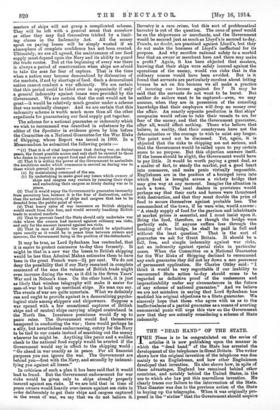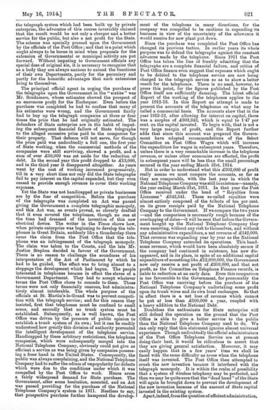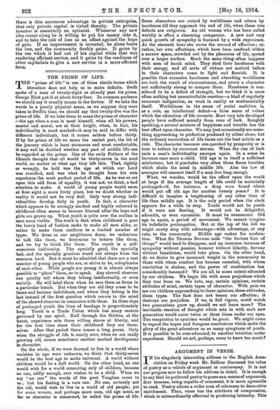THE " DEAD HAND" OF 'flit STATE.
Times is to be congratulated on the series of JL articles it is now publishing upon the manner in which the "dead hand' of the State has arrested the development of the telephones in Great Britain. The writer shows how the original invention of the telephone was due mainly to an Englishman, and how other Englishmen developed that invention. He also shows how, in spite of these advantages, England has remained behind other countries, and notably behind the United States, in the use to which she has put this marvellous invention. He clearly traces our failure to the intervention of the State. That disaster was due to the previous action of the State in buying up the telegraphs. When it was originally pro- posed in the " sixties " that the Government should acquire the telegraph system which had been built up by private enterprise, the advocates of this course invariably claimed that the result would be not only a cheaper and a better service for the public, but also a net profit for the State. The scheme was specially pressed upon the Government by the officials of the Post Office ; and that is a point which ought always to be borne in mind when proposals for the extension of Governmental or municipal activity are put forward. Without imputing to Government officials any special dose of original sin, it is necessary to reccomize that as a body they are always anxious to extend the functions of their own Departments, partly for the pecuniary and partly for the honorific advantages that such extensions bring to themselves.
The principal official agent in urging the purchase of the telegraphs upon the Government in the " sixties " was Mr. Scudamore, whose estimates showed the prospect of an enormous profit for the Exchequer. Even before the purchase was completed he had to confess that many of his estimates were wrong, and the Government finally had to buy up the telegraph companies at three or four times the price that he had originally estimated. The defenders of State enterprise are in the habit of imput- ing the subsequent financial failure of State telegraphs to the alleged excessive price paid to the companies for their property. That defence will not serve, for though the price paid was undoubtedly a full one, the first year of State working, when the commercial methods of the companies were still surviving, showed a profit, and a sum of over £50,000 was set aside for the reduction of debt. In the second year this profit dropped to 413,000, and in the third year it disappeared altogether. As years went by the cost of working increased progressively, till in a very short time not only did the State telegraphs fail to pay interest on the capital expended, but they even ceased to provide enough revenue to cover their working expenses.
Yet the State was not handicapped as private businesses are by the fear of competition. Before the purchase of the telegraphs was completed an Act was passed giving the Government a complete telegraphic monopoly, and this Act was, as events proved, so cleverly drafted that it even covered the telephones, though no one at the time had dreamed of the invention of this new electrical device. The writer in the Times shows how, when private enterprise was beginning to develop the tele- phones in Great Britain, suddenly like a thunderclap there came the claim from the Post Office that the tele- phone was an infringement of the telegraph monopoly. The claim was taken to the Courts, and the late Mr. Justice Stephen decided in favour of the Government. There is no reason to challenge the soundness of his interpretation of the Act of Parliament by which he had to be guided. The effect was to bring almost to a stoppage the development which had begun. The people interested in telephones became in effect the slaves of a Government Department. They had to accept whatever terms the Post Office chose to concede to them. Those terms were not only financially onerous, but administra- tively almost intolerable. The whole purpose of the officials at St. Martin's-le-Grand was to prevent competi- tion with the telegraph service; and for this reason they insisted, first that telephones must be confined to small areas, and secondly that no trunk system must be established. Subsequently, as is well known, the Post Office was driven by the pressure of public opinion to establish a trunk system of its own ; but it can be readily understood how greatly this division of authority prevented the intelligent development of the telephone service. Handicapped by these arbitrary restrictions, the telephone companies, which were subsequently merged into the National Telephone Company, obviously could not give as efficient a service as was being given by companies possess- ing a freer hand in the United States. Consequently, the public was always complaining, and the National Telephone Company had to suffer the odium of unpopularity for defects which were due to the conditions under which it was compelled by the Post Office to work. Hence arose a fairly widespread demand for State purchase. The Government, after some hesitation, assented, and an Act was passed providing for the purchase of the National Telephone Company's system in 1911. Needless to say, that prospective purchase further hampered the develop, ment of the telephone in many directions, for the company was compelled to be cautious in expanding its business in view of the uncertainty of the allowance it would receive for new plant put down.
Since the purchase was completed the Post Office has changed its previous tactics. In earlier years its whole purpose was to defend the telegraphs against the constant advances made by the telephone. Since 1911 the Post Office has taken the line of frankly admitting that the telegraphs are a complete financial failure, and critics of Post Office finance even suggest that expenses which ought to be debited to the telephone service are now being charged to the telegraph service so as to show a better result for the telephones. There is no need, however, to press this point, for the figures published by the Post Office itself are sufficiently damning. The latest official Report of the working of the telephones applies to the year 1912-13. In this Report an attempt is made to present the accounts of the telephones on what may be called a commercial basis. The accounts show that in the year 1912-13, after allowing for interest on capital, there was a surplus of £303,343, which is equal to 1.47 per cent. on the capital invested. To begin with, that is not a very large margin of profit, and the Report further adds that since this account was prepared the Govern- ment have adopted recommendations of the Select Committee on Post Office Wages which will increase the expenditure for wages in subsequent years. Therefore, unless there is a very remarkable increase in the telephone revenue, or unless other economies are effected, the profit in subsequent years will be less than the small percentage secured in the year ending March 31st, 1914.
But in order to understand what this £303,000 of profit really means we must compare the accounts, so far as they are comparable, with the last year in which the National Telephone Company was still in existence—namely, the year ending March 31st, 1911. In that year the Post Office received under the head of " Royalties from Licensees" £342,541. These so-called royalties were almost entirely composed of the tribute of ten per cent. on its gross receipts paid by the National Telephone Company to the Government. If we compare the two years —and the comparison is necessarily rough because of the overlapping of dates—it will be seen that before the Govern- ment bought up the National Telephone Company they were receiving, without any risk to themselves, and without any administrative expenditure, a net revenue of £342,000. That revenue was expanding year by year as the National Telephone Company extended its operations. This hand- some revenue, which would have been absolutely secure if the company had continued in existence, has now dis- appeared, and in its place, in spite of an additional capital expenditure of something like £12,000,000, the Government now only receive a net profit of £303,000, and that net profit, as the Committee on Telephone Finance records, is liable to reduction at an early date. Even this comparison is too favourable to the Government, for presumably the Post Office was receiving before the purchase of the National Telephone Company's undertaking some profit upon its trunk wires and its own local exchanges. So that in effect there is a net loss of revenue which cannot be put at less than £100,000 a year, coupled with a heavy addition to the National Debt.
Doubtless the enthusiasts for State enterprise will still defend the operation on the ground that the Post Office is able to give a better service to the public than the National Telephone Company used to do. We can only reply that this statement ignores almost universal experience. Though undoubtedly the official administrators of the Post Office Telephone Service are at present doing their best, it would be ridiculous to assert that they are giving general satisfaction. Moreover, it may easily happen that in a few years' time we shall be faced with the same difficulty as arose when the telephone itself was invented. The Post Office then attempted to crush the new invention because it interfered with the telegraph monopoly. It is within the realm of possibility that a system of wireless telephony may be perfected, and then we may be quite sure that the "dead hand" of the State will again be brought down to prevent the development of the new invention because of the amount of State capital invested in the existing system.
Apart, indeed, from the question of efficient administration, there is this enormous advantage in private enterprise, that only private capital is risked thereby. The private investor is essentially an optimist. Whenever any new idea comes along he is willing to put his money into it, and to take the risk of loss as an offset against the hope of gain. If an improvement is invented, he alone bears the loss, and the community doubly gains. It gains by the use which it had out of his capital while that was rendering efficient service, and it gains by the readiness of other capitalists to give a new service in a more efficient form.












































 Previous page
Previous page